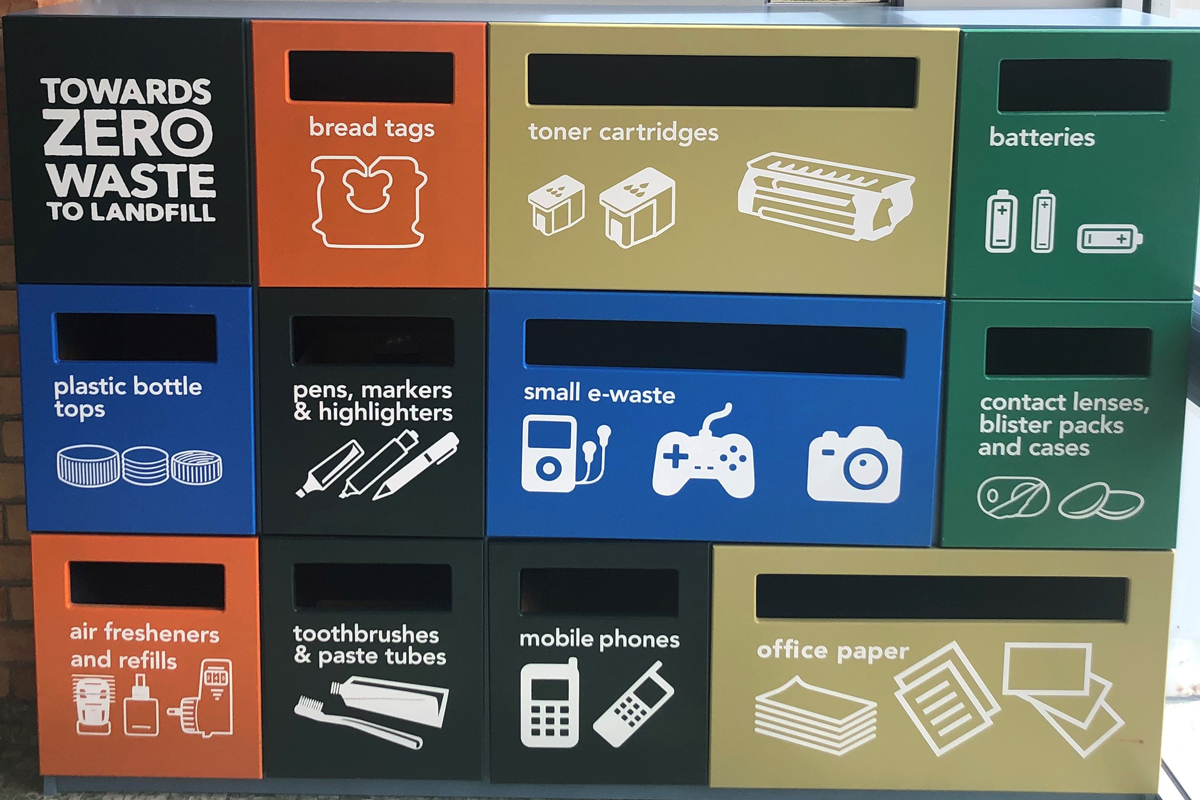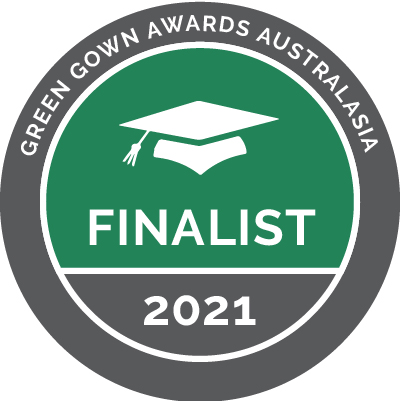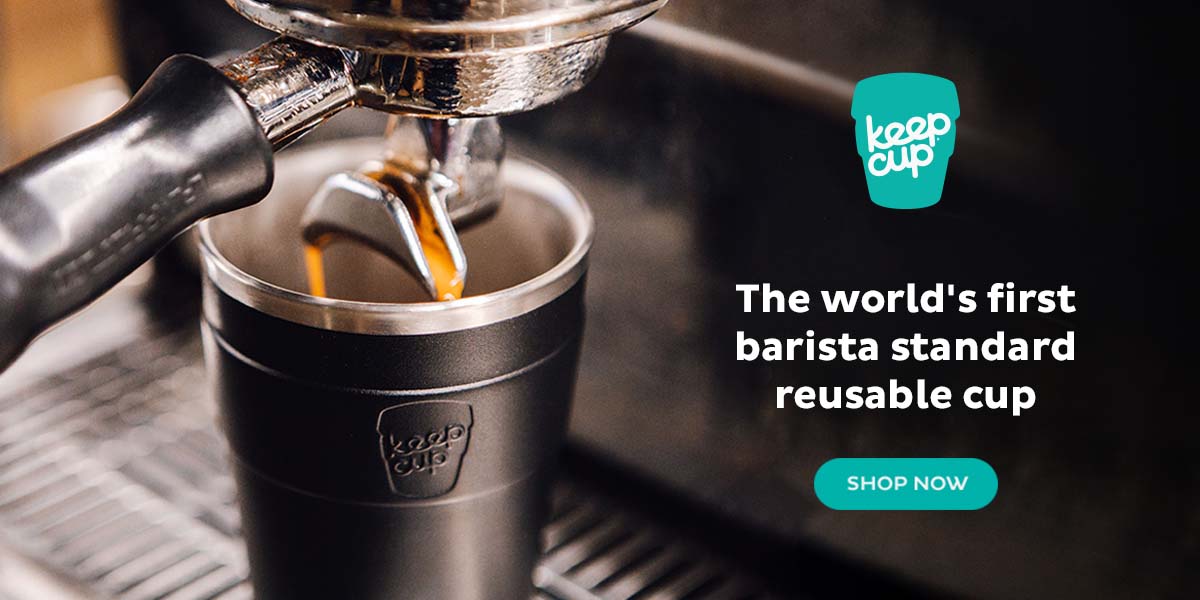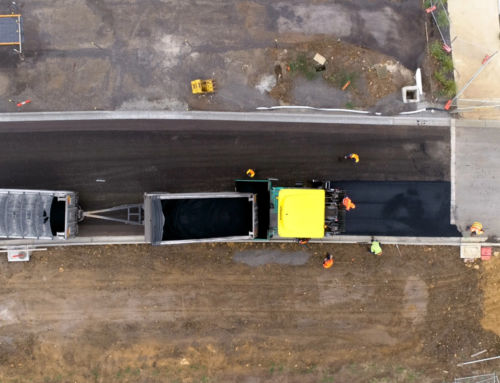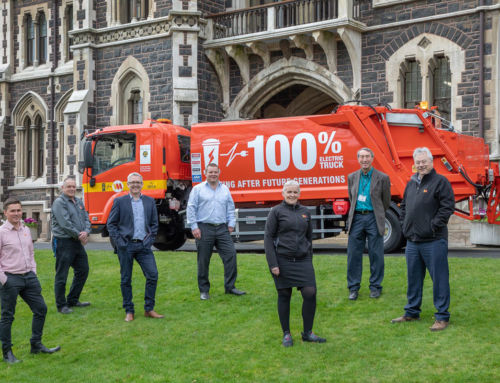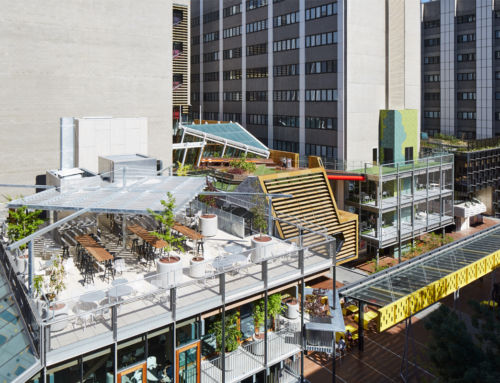Circularity is not going around in circles
The University of Tasmania (UTAS) has delivered significant changes regarding ‘waste’ to bring together procurement, re-use, recycling, and composting. Initial attempts to address our waste issues (a decade ago) sometimes had us running in circles but broadening our approach has led to a circularity journey over the past few years. This journey has delivered significant financial savings and achieved early wins for further commitments in a future-focussed Waste Minimisation Action Plan targeting a minimum 25% reduction of landfilled waste by 2025.
We have delivered new buildings with in-built ‘deconstructability’ in mind as well as re-using materials from other sectors for structural components. Fitting out the builds and major refurbishments comes from excess furniture within UTAS and what we cannot re-use is donated or disassembled for recyclable components. Ensuring organics waste is collected for composting and providing recycling options beyond the co-mingled bin are also elements of circular mindset.
> The initiative
The University of Tasmania (UTAS) has increasingly strengthened its commitment to delivering and exemplifying holistic sustainability over the past 11 years. This includes actions to deliver a circular economy approach within our activities to become a leading sustainable university. Our circularity approach includes the usual recycling programs, but with an extension to fully include procurement changes to preference reduction in purchases and selecting products that contain recycled content and are readily recyclable themselves, re-use of construction materials and designing new buildings to be ‘deconstructable’ and of materials that can be re-used or recycled themselves, a Re-use Program, deployment of recycling walls for non-standard items, separation of organics collected for composting, and a new disposal guide to guide decision making for all staff to achieve better sustainability outcomes.
Building on the successes of various programs and pilots, and the detailed Waste Management Discussion Paper, our first UTAS Waste Minimisation Action Plan is based on the 10 R’s for circularity. The Action Plan includes a target of reducing waste to landfill by 25% by 2025.
Sustainable procurement: Sustainable procurement is included as a key consideration in the University’s Procurement Policy. Sustainable procurement sees a shift from purchasing goods services, utilities and works under conventional procurement criteria of price and quality, to incorporating triple bottom line outcomes. Our procurement approach notes that choosing sustainable products is about trying to find a balance between different characteristics over the life of the product, considering the products supplied and the supplier practices themselves. Priorities to keep in mind when commencing the procurement process are:
- Use less (buy only what you need) and minimise packaging
- Buy local (reduce transport from manufacturer to you)
- Choose items that can be repaired and reused instead of single use
- Choose items that can be recycled at end-of-life or are under a manufacturer’s product stewardship program
Closing the loop is important. For example, our Sustainability Tracking Assessment and Rating System (STARS) reporting for circular economy relevant categories demonstrates a 96% purchase of office paper that is 100% recycled content.
Facilities and Operations
- With over $800m committed to developing new campuses across the state over a 10-year period, the positive impact of a focus on sustainable development and a circularity mindset is clear. A zero-waste circular economy focus is named up in our strategies guiding campus and building design and construction (e.g., Southern Future Urban Design Framework and Masterplan, see pp29-30). Already into delivery stage at our northern campus redevelopments, circular economy highlights include decommissioned Queensland gas pipeline (366 piles x 18 m, or 6.5 km worth) repurposed as pilings for three new builds at our Inveresk campus; use of Reconophalt asphalt for new carparks that has diverted over 710,000 plastic bags and 20,700 toner cartridges from landfill, and the product uses reclaimed asphalt and aggregate and sand from street sweepings and hydro-excavation materials; Interface® carpets throughout as recycled and recyclable; and designs focused on ‘deconstructability’ for materials re-use in the future when buildings are decommissioned.
- Our Re-Use Program started in 2016 with furniture and has since expanded in number and types of items being relocated within the University or donated to local charities (e.g., stationery, lab equipment). The Re-Use Program has avoided a substantial amount of waste (40,610 kg) and delivered significant savings (over $500,000 since inception). With all the transitions, transformations, and decanting of furniture between campuses and buildings, the Re-Use Program has been and will continue to be key in providing literal truckloads of furniture for teaching and office spaces across all our Tasmanian campuses, as well as providing an avenue to re-home any surplus furniture no longer needed through donations and dis-assembly for recyclable components as a last resort.
- Since late 2019, 23 recycling walls have been deployed across all our Tasmanian campuses to enable staff and students to deposit those hard to recycle items not taken through the standard co-mingled streams and to help them choose to contribute to the circular economy. Finding and using the walls is enabled through the provision of an online interactive map and users guide. Items like bread tags, batteries, printer cartridges, plastic bottle tops, small e-waste items and mobile phones are just some of the recycling streams which are collected across our campuses and then forwarded onto a mixture of local and mainland-based recyclers. The items get turned into new items such as outdoor and garden furniture, alternative road and pavement materials and even recycled stationery. The recycling walls can serve to teach staff and students about our commitment towards a zero-waste society, as well as a real-world example of a circular economy. Since their rollout, the recycling walls have diverted over 525kg of waste from Most of the recycling walls were made from old filing cabinets sourced from the Re-Use Program. These ‘DIY’ recycling walls have custom graphics attached to the fronts, tops, and sides to provide information about the recycling streams being collected (where the materials go, how they are recycled and into what sorts of products).
- Sustainability with a circular economy focus is also embedded in the new Asset Management Procedure (approved June 2021) and the Clean out and Disposal Process Guide (2020). The University recognised a need for a tool to help staff sustainably deal with redundant items in a clean-up process. This guide fills a gap to enhance the outcomes of clean-up activities. The guide provides simple to follow step-by-step processes on options to help achieve improved benefits through re-use, donation, recycling, etc. to minimise waste to landfill and maximise value to the University and supported organisations. The first draft was developed in consultation with College of Science and Engineering staff during a major cleanout in 2020 to ensure sustainable outcomes. It has been used extensively across the University since.
- Following a successful trial in three buildings in 2020, a ‘bin rationalisation program’ has been rolling out across all campuses that includes new signage, first ever comprehensive collection of food organics from all tea rooms that are commercially composted rather than landfilled and removal of under desk bins to address contamination issues.
- In late 2020, UTAS successfully applied for a grant to install an in-vessel aerobic composter to process up to 120 kg of organic materials per day at our expanded Inveresk campus to support the on-site cafes and the extensive community gardens planned for the site. Evaluation of quotes for the system are mid-process at the writing of this application.
- Another part of the bin rationalisation program involves installation of bin sensors on skips to reduce collection frequency as well as address contamination issues. The trial on ten campus skip bins in early 2021 is already saving around $5000 per month, which has supported further roll-out to all other external skip bins before the end of 2021.
- The Plastics Minimisation Working Group of the Sustainability Committee has been focused on minimising single-use plastic at UTAS, including being instrumental in delivering change in our new catering contracts to require commercially compostable packaging to be provided by all catering providers, which is in line with the City of Hobart’s ban on single use plastics in catering that came into effect on 01 July 2021.
- Another example includes the donation of dozens of abandoned bikes over the past four years to local ‘bike kitchens’ and Men’s’ Sheds in Tasmania as a way of demonstrating repair first principles of circularity.
Learning, Teaching and Research
UTAS has a strong record in environmental research that addresses local and global issues. UTAS is a core member of the recently awarded Sustainable Communities and Waste Hub (SCWH) that is one of four research Hubs as part of the Australian Government’s National Environmental Science Program (NESP2). The SCWH is a 7-year, multi-disciplinary and multi-institution initiative delivering innovative sustainability technologies, knowledge products and services for urban and regional communities and the waste management sector. The Hub’s solutions will enable the transitioning of production systems, investment, and consumer behaviour towards a circular economy.
Student Experience and Engagement
- Students are directly involved in a wide range of circular economy-related projects through the Sustainability Integration Program for Students (SIPS). Since 2017, 113 students have undertaken projects focused on elements of a circular economy approach that have directly impacted on policy, procedure, programs, and projects. SIPS students undertook the research to design and initiate the recycling wall program, verified the Re-Use program calculations for the Australian context because the program was developed in the United Kingdom, undertook auditing to calibrate the new bin sensors to ensure data accuracy and are collecting pre and post waste volume data to measure the impact of the bin rationalisation program.
- Through waste related SIPS projects students can consult, seek advice and network with a wide range of external waste partner organisations in Tasmania including Envorinex, Replas, Northern Tasmanian Waste Management Group, Hydro Tasmania and Hobart Airport, and local councils including Hobart and Burnie.
- Waste audits with SIPS students have included TIA (Tasmanian Institute of Agriculture) labs and staff offices at Cradle Coast campus, TUSA event for students at Cradle Coast campus, external skip bins at Newnham campus, tea room waste at Sandy Bay campus, food waste from on campus cafes, food waste from Student Accommodation Newnham.
- Our TEFMA waste data reporting is informed by waste audits undertaken by Environmental Impact Assessment (EIA) students over consecutive years.
- Students have worked with the Sustainability and Student Living teams across consecutive years to reduce waste to landfill through encouraging donations and recycling during the end of year students’ move-out period.
- To reduce food waste to landfill, students at the Student Living sites in the North West at the Atrium Apartments, in Hobart CBD at the Hobart City Apartments and at Sandy Bay have access to either compost bins or worm farms. Across the sites there is one compost bin, two hot compost bays and ten worm farms. All are managed by students with support from on-site Student Living or academic staff mentors. Current and alumni SIPS students were involved in the research and design of these composting projects.
- Tasmanian University Student Association (TUSA) officers led the design and set-up for the on-campus mug libraries for the Sandy Bay campus. TUSA reps and staff in the North created the TUSA op shop, where students and staff could donate kitchen ware and other household items to be purchased by other students for a gold coin donation.
- Student projects have also focused on research waste, including diverting hundreds of kilograms of fish from landfill at the Taroona experimental fish facility and a review of sustainable lab programs at other universities with recommendations and opportunities shared with lab managers.
The Green Impact Program for staff engagement started in 2018 and was expanded to include student teams in 2020. A bespoke student program started in 2021, with waste reduction and circularity being a key focus. UTAS staff and students have won three Australasian Green Impact champion awards, with waste reduction typically featuring on their applications. For example, our 2020 staff winner, who as part of their role hosts regular lunches for students, enables a significant reduction in waste to landfill by providing reusable crockery for students and staff at events, as well as for day to day use on campus that people can borrow and bring back. Our 2020 student winner donates time to wiping excess University laptops for student donation and is a founding member of the UTAS students’ Zero Waste Society.
> Environmental and social benefits
Operationally derived environmental benefits include reduced waste to landfill from reuse, composting and recycling, contributing to the UTAS journey towards zero waste and application of a circular economy approach in decision making.
An important additional environmental benefit from divesting waste from landfill is the consequent reduction of greenhouse gas emissions, especially from organic waste. It is estimated that once our target of 25% reduction of waste to landfill is achieved, UTAS will be avoiding > 600 t CO2-e per year.
Social benefits come from the involvement of staff and students in governance (e.g., staff and students were consulted in the development of the Waste Minimisation Action Plan) and are directly involved in implementing initiatives (e.g., through the SIPS program). Staff and students are empowered when they feel they understand how change is happening, and when they can participate in and contribute to UTAS sustainability outcomes.
Other social benefits come from donations to promote reuse. For example, a key initiative during the pandemic has been donation of out of warranty computers to students in need through the Tasmanian University Student Association (TUSA).
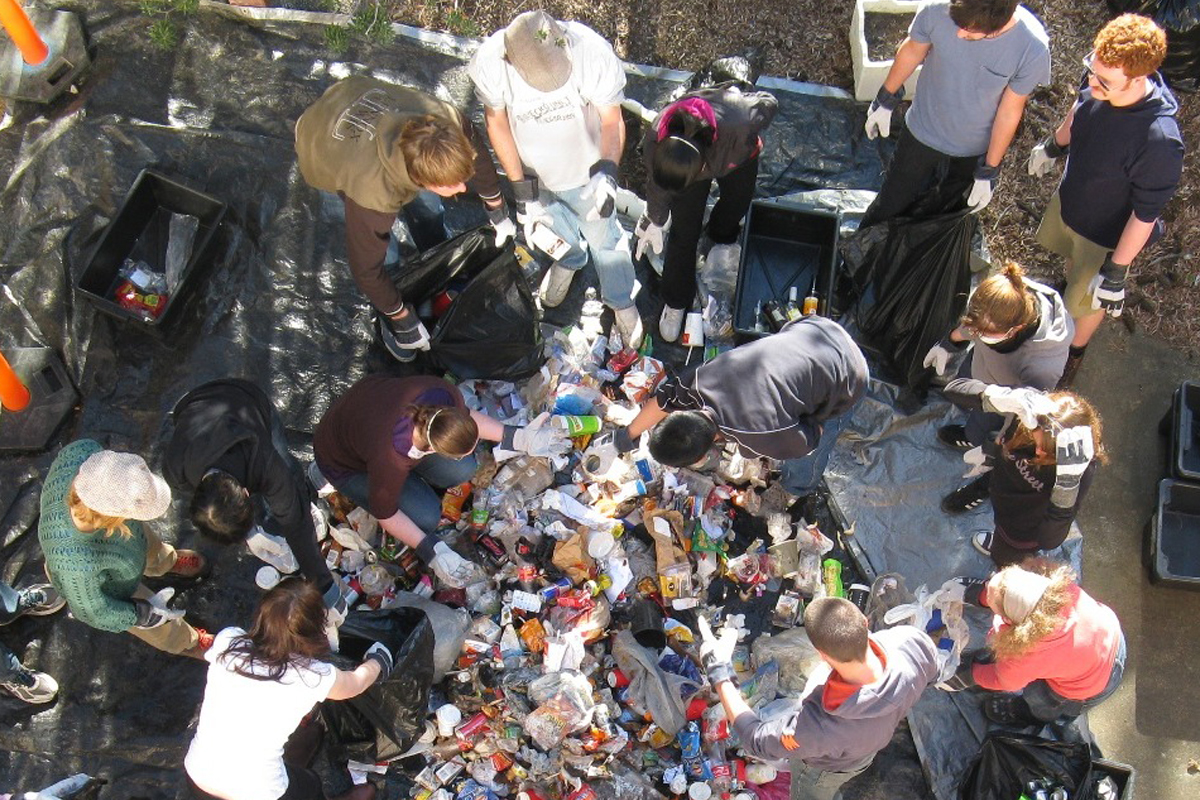
> Leadership and engagement
Our nomination highlights where we have not only focused on ‘turning around’ our internal University approaches and operations, but also on our externally focused activities to tie into what our communities are doing (e.g., local and state government, schools) or can be doing with a bit of sharing from the University for consistent messaging for staff and students at work/study and at home. For example, our recycling walls are based on an initial collaboration with the City of Hobart who lent us a prototype for us to pilot it and from there we have been instrumental in taking the approach and signage across the state and beyond.
‘Don’t Mess with Burnie’ is a recent multi-year initiative facilitated by UTAS with the support of industry partners to equip schoolchildren with skills, knowledge, and awareness to preserve their local environment and the planet. Students participated in activities demonstrating how recycled materials are sorted and separated, collected litter from the West Beach foreshore and created art from natural materials.
Another way in which our proposal is unique is through the involvement of students throughout the University’s journey towards zero waste to landfill. To leverage opportunities to support student leaders, students have been encouraged to lead or participate through the Sustainability Integration Program for Students. Since 2017, 113 SIPS students have focused on circularity through paid internships and curricular projects.

> Wider societal impact
As the only university in Tasmania, there is a unique opportunity that UTAS understands and acts on the latest available information and research to lead by example. Some of our researchers have led and informed the national conversation on the impacts of plastics waste on local and global environments, including on remote beaches in the Pacific. While they may seem a small contribution, the Recycling Walls have received positive feedback that they demonstrate that many products can have a life beyond the initial use and, importantly, highlights l that they could make choices that do not involve the need to recycle at all, especially if they have a product for which there is no recycling option readily available to them.
Furthermore, students that have been empowered to lead and/or involved in circular economy projects, will carry their passion and learnings to their jobs and communities, resulting in flow-on impacts to the wider society.
